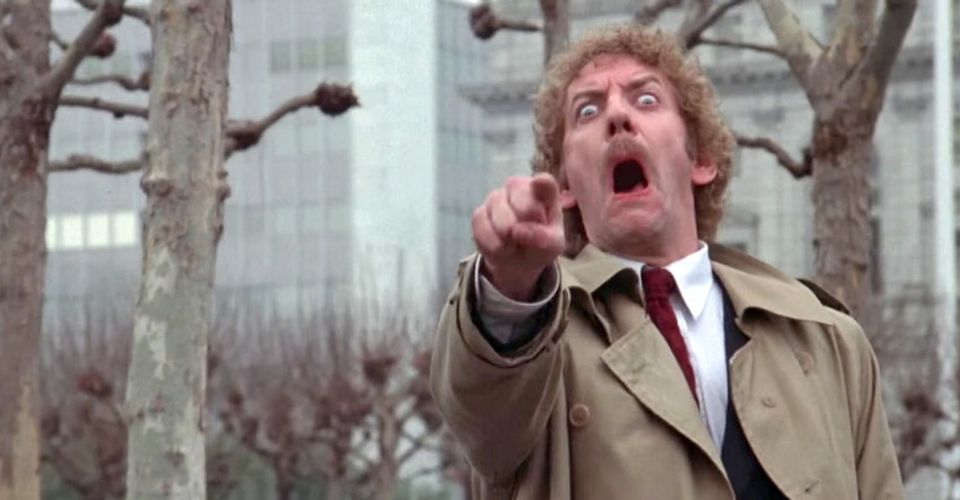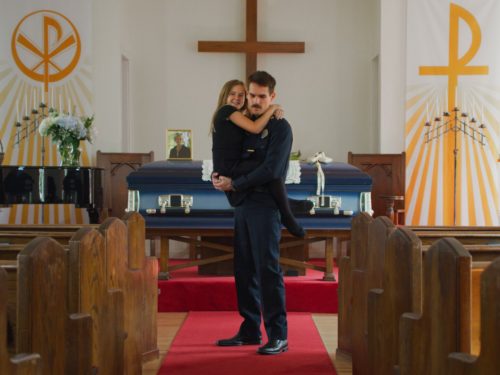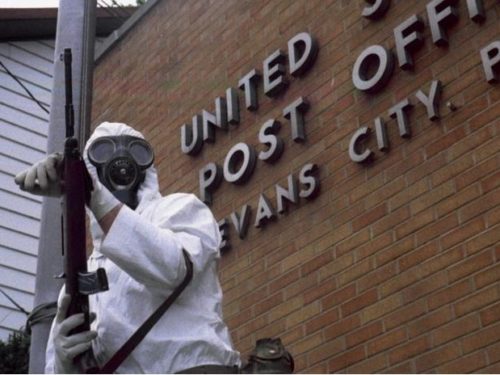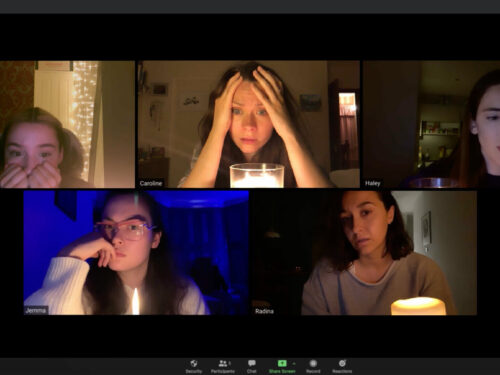The corollaries between today’s world and Body Snatchers don’t diminish the film’s horror. Instead, it makes reality that much more frightening
Dr. Miles Bennell was chased out of his small suburban town with an angry mob at his heels. He was headed for the highway, hoping to warn people that an unimaginable danger had arrived. But as he crossed the border into the big city, his pursuers stopped and watched as the sweaty, sleep-deprived man with a crazed look in his eye pounded on car windows screaming, “They’re here already! You’re next!” He’s called a drunk; cars swerve around him.
“Let him go,” the leader of the mob says. “They’ll never believe him.”
*****
The invasion has begun before the opening credits are finished. There is no mothership hovering over the White House, no robot emissary sent with a galactic warning; spongy strands from another planet caught a solar wind and are simply mixing with the San Francisco rain. These gel-like strands latch onto plants and begin to blossom as pale red flowers. The first shots of 1978’s Invasion of the Body Snatchers show how quickly the invasive beings take root, but a bizarre uncredited cameo of Robert Duvall as a priest swinging in a park immediately steals our attention. He’s watching a teacher instruct her elementary school students to gather the flower pods. In a dull tone, her gestures rigid, she tells her students to take the flowers home to their parents.
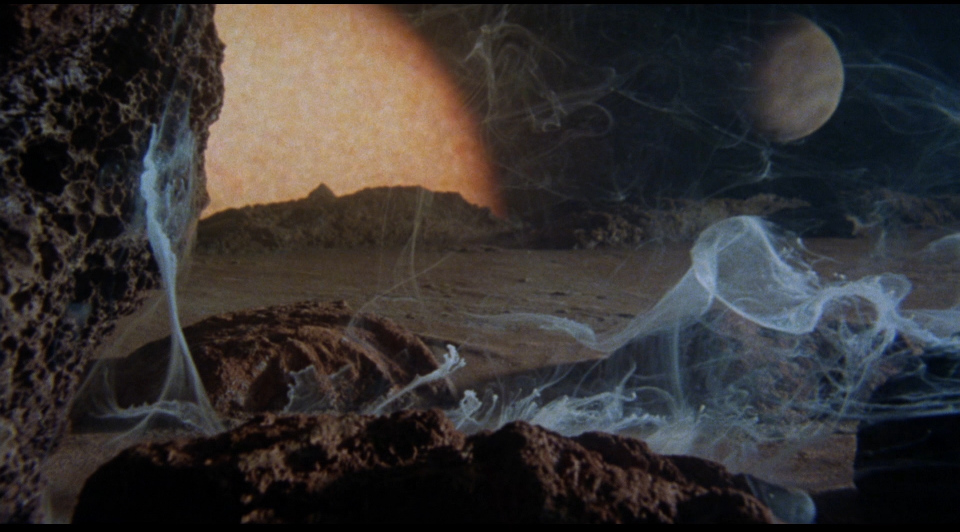
Duvall’s cameo and the harvest are quickly dismissed as we meet Elizabeth Driscoll (Brooke Adams), a scientist at the Department of Health, who recognizes the flowers as unfamiliar. She takes one home hoping she can claim the discovery of a new grex — two species that cross-pollinate to create a new hybrid that she says often thrive on devastated grounds. Her boyfriend, a dentist named Jeffrey, is already dressed in a suit for work the next morning as he sweeps broken glass off the floor. He presumably knocked over the flower jar. Although he was frisky and talkative the night before, he barely speaks as he takes out the trash. Elizabeth peaks through the window and sees a garbage truck waiting for him at the curb. The truck is loaded with gray dust, and Jeffrey adds a fresh bin full of dust to the pile. They stand together for a moment, silent as the trash man cryptically points down the street. Jeffrey basks in the dust cloud’s remnants for a moment, as if seeing the world for the first time. Elizabeth’s flower is gone and her concern about Jeffrey’s demeanor is obvious. Her walk to work only makes her discomfort grow. People sprint down the street around her, looking over their shoulders the whole way.
San Francisco health inspector Matthew Bennell (Donald Sutherland) begins by busting an upscale French restaurant for its deceptive ingredients. The capers are rat turds, and they’re the first visual metaphor reminding us that nothing is as it seems. He and Elizabeth are work friends who share an amicable bond that verges on flirtatious. She shows up at Matthew’s house after Jeffrey unexpectedly leaves for a late-night meeting. She attempts to explain that Jeffrey is acting like a new person. She worries she’s losing her mind. He tries to eliminate possible reasons Jeffrey may have changed: he’s having an affair, he’s gay, he’s a Republican. Although he jokes with her about Jeffrey, he seems to enjoy being able to talk behind his back, and his glances at Elizabeth grow more longing.
Matthew seems to doubt Elizabeth’s story, but he soon begins to encounter more people who claim their loved ones are just different. From the dry cleaner who points at his partner and says, “That not my wife,” to the woman at the bookstore who insists one of her husband’s scars isn’t right, more spouses share the same story. Articulating the change is impossible, but their conviction is concrete.
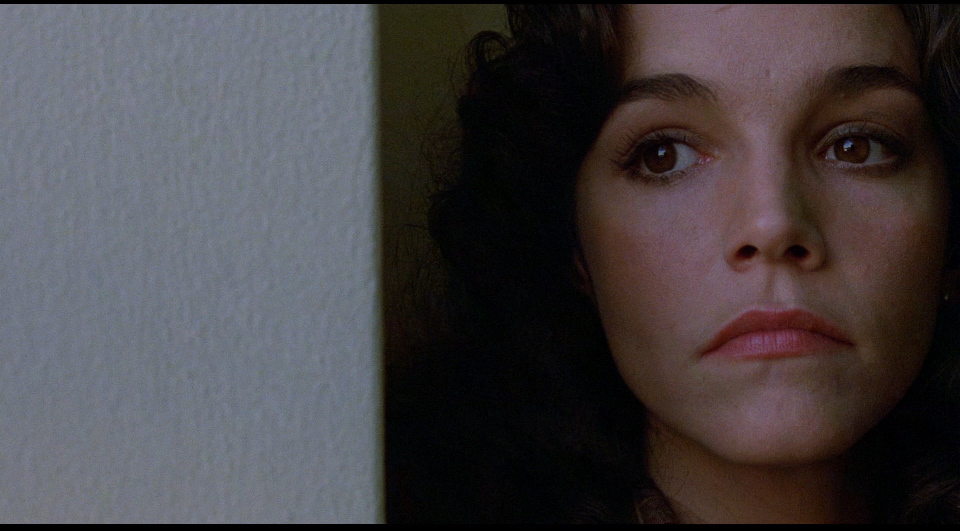
The next day, Elizabeth follows Jeffrey across the city on a string of what appear to be abstract errands with strangers. She surmises with Matthew that it could be a conspiracy, a passing secret in which people are suddenly connected. “Yesterday it all seemed normal,” she says. “Today everything seemed the same, but it wasn’t. It was a nightmare.” As the world grows stranger by the second, no one wants to accept that the fabric of reality is not only frayed, but completely torn.
*****
Dr. David Kibner (Leonard Nimoy) is a celebrity psychologist and a friend of Matthew’s. He introduces Elizabeth to discuss what could possibly be going on with Jeffrey. Kibner’s diagnosis is that a hallucinatory flu is sweeping the city. He insists normality will resurface in a matter of days, as it has in every case he’s seen. Matthew wonders if he should have the Health Department begin an investigation, but Kibner suppresses his fear and insists that if they all ignore the problem, it will simply disappear. But once Jack and Nancy Bellicec (Jeff Goldblum and Veronica Cartwright) show Matthew a body in their mud sauna, in the process of duplicating Jack’s every feature, down to his bleeding nose, he does everything in his power to stop whatever these replicant bodies are from taking over.
The camera begins to move like an impatient pedestrian, bounding down the sidewalk past Matthew in a phonebooth, only to look back at a man knocking on the door. It follows him through the streets and dances around people, always aimed up to capture the lights on the marquees. Those who haven’t yet transitioned run through crowds. Sirens blare incessantly. Shadows stretch in multiple directions, casting lengths exponentially larger than the people scurrying about. The most unnerving aspect is how characters lining hallways and standing in the streets watch Matthew as he moves with his head down, unaware of the eyes that track him as closely as the camera. They gaze in silence. The score is often little more than a heartbeat.
Matthew’s fatal flaw is his faith in a functioning system. He jumps through every bureaucratic hoop in an attempt to alert the proper authorities that San Francisco is in danger. He’s met with incredulity. Everyone in power either denies any cause for concern, accuses him of wasting their time, or asks him to keep quiet while promising to investigate further. Crucially, they often ask to talk the next day — after an implied good night’s sleep. It’s not until he makes a call from his home and the operator knows his name that he realizes he’s living in a new world. Matthew is clearly skilled in his work, and as a functioning cog in the machine, he can’t believe or understand how the entire system of defense could break down so easily. He holds onto hope until every last source of it has been dismantled and demolished.
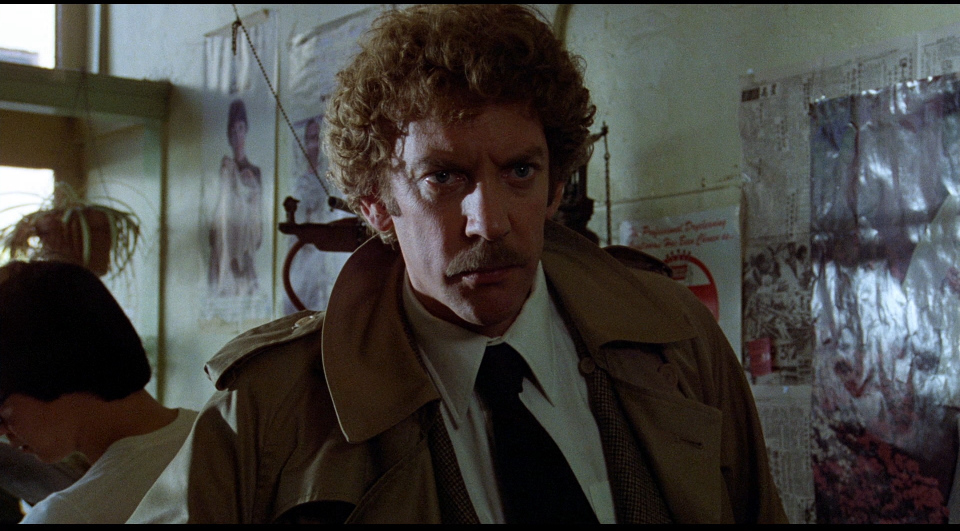
When a replicated Kibner finally unveils the pod people’s grand scheme, Matthew and Elizabeth can’t stand to hear it. The invaders came from another planet and, with the help of a solar wind, landed on Earth. Sleep is how they take over. Like a light switch, once someone loses consciousness, they snatch the life away from them and transfer into a freshly replicated body. “You will be born again into an untroubled world,” a reborn Kibner tells them as he readies a syringe with a sedative. “There’s no need for hate now. Or love.” These pod people want a simple existence. They create a society without love, a world without fear — an existence devoid of any and all emotion. Their lobotomized idea of life is to bask in the silence of survival. Upon hearing this, Elizabeth says, “I love you, Matthew.” They both know it’s too late for love, but love is the greatest protest in an emotionless world.
This year has been unlike any other in history. The novel coronavirus has spread across the world and repeatedly proven that it will not be stopped unless we actually rise up as a planet and take preventative measures seriously. Almost a quarter of a million people have been killed by Covid-19 in the U.S. alone. [As I type this, the U.S. just set yet another daily case count record, with more than 86,600.] America feels like an overly emotional, partisan battleground, which is exactly what the pod people want to eradicate — imagine America in 2020 without hate — but the lockdowns have taken us to the most lifeless version of our country we’ve ever known. The fear of the coronavirus is not completely rooted in death. One fear is about losing the joy in life brought by friends and loved ones. Another is that our lives might resemble that of the pod people if we fail to stop the virus and are forced to shelter in place for months, or even years longer. In this quieter, lonelier America, we’re forced to reckon with who we really are when we’re left to our own devices.
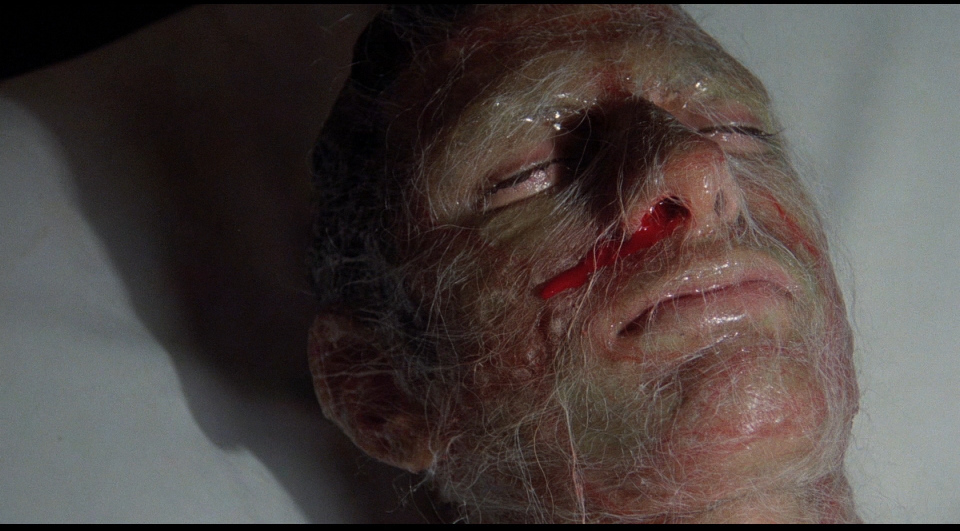
No matter how bad the coronavirus outbreak becomes, we still have numerous other battles that will define our future. The seeds of Covid-denial are rooted in climate change denial, and our negligence has already done more harm than we could ever know. The opening shots of Body Snatchers are so effective because we know on some level that if anything outside of human-made conflict ravages Earth, we are inevitably doomed. Body Snatchers does not exploit our paranoia; it weaponizes it and shows us that our fears of death, obscurity, and societal collapse are justified.
To say Body Snatchers predicted the coronavirus outbreak is a gross misreading of the film and Jack Finney’s original 1955 novel. To say it exists in a familiar environment is more appropriate. Our society is so resistant to shock that when real emergency strikes, the mass reaction is to deny, ignore, or mock the messenger who warns that our safety may be at risk. It’s hard not to think of both Dr. Anthony Fauci being called a “disaster” by the president and climate activist Greta Thunberg’s effigy being lynched in Rome when we see Matthew trying to fight the invasion. As Body Snatchers shows, by the time authority figures begin to listen to concerns about a potential disaster, it’s already too late. Being informed is an inconvenience. But our leadership has also proven that ignoring or downplaying a problem will not make it go away. Now, Body Snatchers is less of a corollary and more of a blatant mirror of our country: germs, incompetent leaders, and a complete distrust in the systems that are designed to protect us. But the corollaries don’t diminish the horror. Instead, it makes reality that much more frightening.
*****
In July, thousands of Americans began receiving mysterious seed packages from China. Vice’s Motherboard recently published an investigation about the seeds. It appears they were part of a brushing scam, in which a company sends its products to random addresses so it can write reviews of its own goods as a swarm of verified buyers. Although the seeds’ origins are still uncertain, one thing is: despite warnings from the government to turn in or destroy the unknown seeds, hundreds of Americans planted the seeds anyway. Some reportedly ate the seeds. As the coronavirus outbreak has exposed every possible form of human shortcoming, a plant-based apocalypse is not difficult to imagine simply because humanity has proven itself to be incapable of caring for itself, each other, or our home planet.
The beauty of Invasion of the Body Snatchers is that it shows how a microscopic enemy can silently cause the downfall of an entire planet. So much of horror is about belief, with endings being the often-insurmountable Achilles Heel. Nothing taints a passable horror film more than an over-ambitious stumble in the final act that makes the audience disavow its faith in the film’s vision. The scariest horror films let the killers win. The greatest villains disappear into the ether, leaving only a lingering sense of fear in their absence.
This is why the endings in each adaptation are so crucial to their respective messages. Don Siegel’s Invasion of the Body Snatchers (1956) unfolds as a frame story with a potential happy ending. Dr. Miles Bennell (Kevin McCarthy) is in a hospital, and the doctors and authorities listening wonder if they’d be justified to throw him in a padded cell and discard his fantastical story of pod people replicating bodies and attempting to take over the world. He says his town was overtaken in a matter of days, and that he was chased to the city limits after losing the love of his life. Unfortunately, the movie should have ended with Miles shouting on the highway. This version leaves us in a place of hope. After the police find a truck carrying the pods Miles described, his corroborated story is then used as evidence of an impending takeover. He’s deemed sane, and we are left with an almost nationalistic sense of pride; of course the American military and police force could defeat a small town full of pod people and stop the spread. It’s almost a copout to end the story on a happy note, which is why Dr. Miles Bennell’s cameo in the 1978 version is so important. [Of note: Siegel appears as a taxi driver in Kaufman’s adaptation.] In this reality, Miles never told his story to the doctors and police. Instead, he made his way deeper into the city until he bangs on Matthew’s car window. The Bennells look at each other with a sense of unknown connection. “It’s already too late,” Miles yells before he’s chased away by a streamlined mob including police, men, women, and children. He’s quickly run over and killed. The invaders here don’t stop at the city limits. Their global takeover is almost complete by the time the warnings are even heard.
Philip Kaufman pursued the story from an interesting angle. Instead of making a carbon copy of the small-town original, he doubled down on the invasion by placing it in one of the most populous and wealthy cities in the world. Movies like The Crazies often show how small-town America may be vulnerable to tragic incidents that would later evolve into unsolved folklore or a modern-day Roanoke. By moving the story from a quaint suburban town with dirt roads, the devastation is all the more impressive. How they intertwine makes them complementary acts, a two-film sequence rather than an original and its remake.
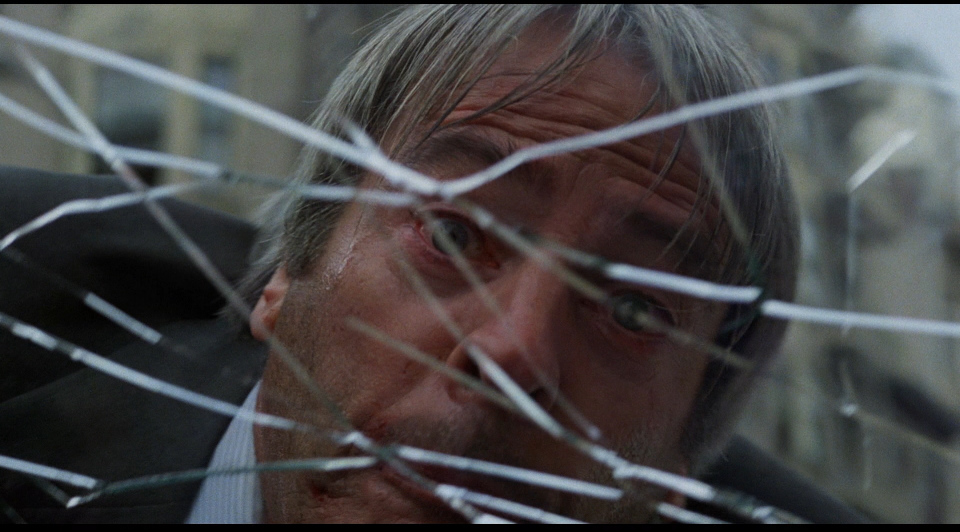
Kaufman encapsulates our resistance to the large-scale, real life anxieties that threaten our very fabric as a species. The film’s horror has little to do with the dread of facing the sixth mass extinction event in our planet’s history. Instead, it is about the fear of losing individuality, a sense of self, a purpose in life. It’s about a vibrant society being replaced by a mass of lifeless survivors. By slowly stripping away the very things that make us human, by severing the connections that keep us going, and watching society dissolve, Invasion of the Body Snatchers preys on our sense of fear until an absence of life is all that remains.
From the rat turd soup at the health inspection stop through to the final stand at the factory farm, the stakes grow with each scene from a molecular level to a global collapse. The film tears hope away until it finally rips the tablecloth off with its iconic final shot. It crescendos through various stages of hysteria until all hope for humanity is wiped out and all institutional safeguards fail. The world has already been made new, not just a quiet suburban town. There will be no fight; it was finished before it had a chance to begin.
That’s what makes the final scene so effective. Matthew appears to have assimilated into the new world as a robot-like worker. His posture improves, he walks in an orderly fashion with the others, he cuts articles out of the newspaper at his desk. But while walking home, a still-unchanged Nancy calls his name. She’s been able to stay awake and blend in without being taken over. But when she spots him, she smiles and runs over to him. When Matthew faces her, drops his jaw, and inhale-screams, Nancy’s relief at seeing her last source of hope, of a chance at escape, of a chance to maintain some semblance of normality, is immediately demolished by the full force of the new world. Its unforgiving deathgrip drains the last drops of her humanity. We’re left in pitch darkness as the camera freeze-frames and zooms into the void of Matthew’s mouth.
All hope is lost — a perfect ending.
Invasion of the Body Snatchers is available on 4K UHD and Blu-ray here
Find more October Horror 2020 here:
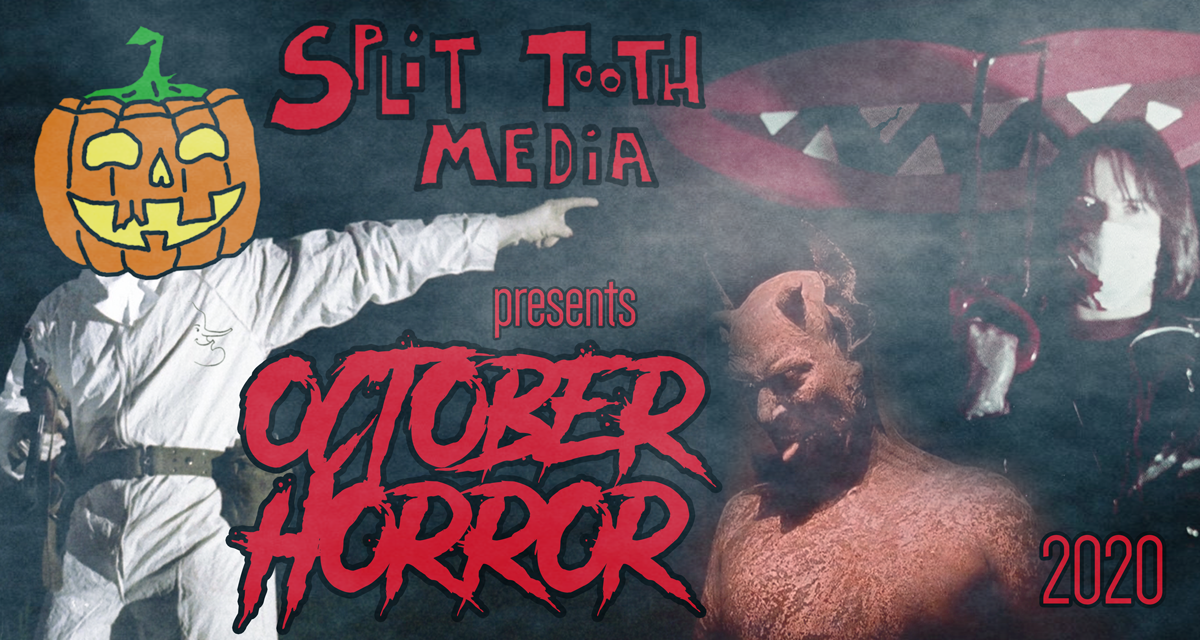
Follow Split Tooth Media to stay up to date with all things October Horror
(Split Tooth may earn a commission from purchases made through affiliate links on our site.)

